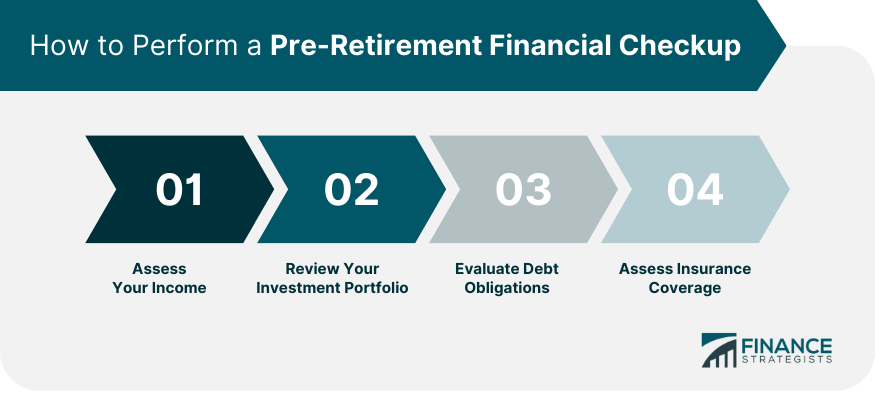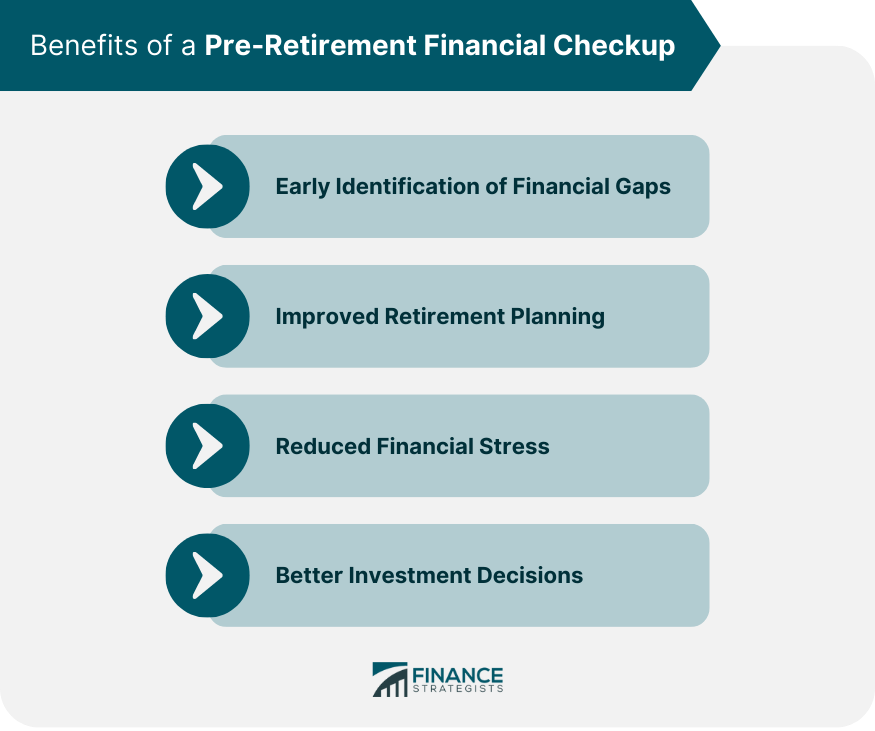A pre-retirement financial checkup is a comprehensive evaluation of an individual's financial situation and preparedness for retirement. It involves assessing various financial factors, such as retirement income, investment portfolio, debt obligations, and insurance coverage, to ensure that the individual is on track to meet their retirement goals. A checkup can be conducted by a financial advisor or through self-assessment using financial planning tools. Conducting a pre-retirement financial checkup is essential for individuals to ensure they are well-prepared for their retirement years. It helps in identifying any potential shortfalls or gaps in their financial plan, allowing them to make adjustments and optimize their resources to achieve a comfortable retirement. Furthermore, it can lead to better investment decisions and reduced financial stress, providing a sense of security and confidence as retirement approaches. Social Security benefits are a critical component of retirement income for many individuals. It is essential to understand how much you can expect to receive from Social Security based on your work history and the age at which you plan to start receiving benefits. You can estimate your Social Security benefits using the Social Security Administration's online tools or by reviewing your Social Security statement. Keep in mind that claiming benefits early can result in reduced monthly payments, while delaying benefits can lead to higher payments. If you have a pension plan through your employer, it can be a valuable source of retirement income. Be sure to understand the terms of your plan, including the amount you can expect to receive and any options for taking the benefit, such as a lump sum or monthly payments. Additionally, review the plan's vesting schedule to ensure you are fully vested in the benefit. If you have any questions or concerns about your pension plan, consult your human resources department or a financial advisor. Retirement savings accounts, such as 401(k) plans, IRAs, and Roth IRAs, play a crucial role in funding retirement. Assess the current balance of your accounts and evaluate the projected growth based on your investment strategy and time horizon until retirement. Consider whether you are contributing enough to your accounts and if any adjustments should be made, such as increasing your contribution rate or taking advantage of catch-up contributions if you are age 50 or older. Additionally, review the tax implications of your retirement savings accounts to optimize your withdrawals in retirement. Your investment portfolio should include a mix of assets that align with your financial goals and risk tolerance. Common investment types include stocks, bonds, mutual funds, exchange-traded funds (ETFs), and real estate. Review the performance of your investments and determine if any changes are needed to align with your retirement objectives. Ensure that you are well-diversified across asset classes and sectors to minimize risk. Risk tolerance refers to your ability and willingness to withstand fluctuations in the value of your investments. It is essential to understand your risk tolerance, as it influences your investment strategy and asset allocation. As you approach retirement, your risk tolerance may change, and it might be necessary to adjust your investments accordingly. This may involve shifting to more conservative investments or rebalancing your portfolio to maintain an appropriate level of risk. Asset allocation is the process of dividing your investments among different asset classes, such as stocks, bonds, and cash, to balance risk and return. A well-diversified portfolio is essential for long-term investment success and can help protect your assets during market downturns. Review your current asset allocation and compare it to your target allocation based on your risk tolerance and investment goals. If necessary, make adjustments to your portfolio to ensure it remains aligned with your objectives. Keep in mind that your asset allocation may need to be adjusted periodically as your financial situation, goals, and risk tolerance change. Credit card debt can be a significant financial burden, particularly as you approach retirement. High-interest rates and monthly payments can hinder your ability to save and invest for the future. Assess your current credit card debt and develop a plan to pay it off as quickly as possible. This may involve consolidating debt, negotiating lower interest rates, or prioritizing higher-interest debt. Reducing credit card debt can free up resources for retirement savings and help improve your overall financial situation. Mortgage and other loan obligations can also impact your financial readiness for retirement. Review your current mortgage and loan balances, interest rates, and repayment terms to determine if any adjustments are needed. Consider whether it makes sense to refinance your mortgage to secure a lower interest rate or accelerate loan payments to reduce debt before retirement. Keep in mind that entering retirement with minimal debt can provide greater financial flexibility and peace of mind. Life insurance can provide financial protection for your loved ones in the event of your death. As you approach retirement, it's essential to review your life insurance coverage to ensure it meets your current needs and goals. This may involve updating beneficiaries, adjusting coverage amounts, or considering different types of policies, such as term or permanent life insurance. Consult with a financial advisor or insurance agent to determine the best coverage options for your situation. Health insurance is crucial for covering medical expenses during retirement. Review your current health insurance plan and assess whether it will continue to provide adequate coverage in retirement. If you are not yet eligible for Medicare, explore options for individual health insurance plans or consider extending your employer-sponsored coverage through COBRA. Once eligible for Medicare, research supplemental insurance options, such as Medigap or Medicare Advantage plans, to ensure you have comprehensive coverage for your healthcare needs. Long-term care insurance can help cover the costs of care in a nursing home, assisted living facility, or at home if you become unable to perform daily activities due to illness or disability. As the cost of long-term care can be significant, it's essential to consider whether long-term care insurance is appropriate for your situation. Evaluate your potential need for care, the cost of premiums, and the benefits provided by various policies to determine if long-term care insurance is a suitable addition to your retirement plan. A pre-retirement financial checkup helps in identifying any financial gaps or shortfalls in your retirement plan, allowing you to make necessary adjustments. By addressing these issues early, you can optimize your resources and improve your chances of achieving a comfortable retirement. A thorough financial checkup can lead to better retirement planning by providing a clearer understanding of your financial situation, goals, and needs. This insight can help you make informed decisions regarding your retirement income, investments, debt management, and insurance coverage. Knowing that you have a solid retirement plan in place can significantly reduce financial stress. A pre-retirement financial checkup helps build confidence in your financial future, allowing you to focus on enjoying your retirement years. A financial checkup can provide valuable insights into your investment portfolio, risk tolerance, and asset allocation. This information can guide you in making better investment decisions and ensuring that your portfolio remains aligned with your retirement goals. A pre-retirement financial checkup is a vital step in ensuring that you are prepared for your retirement years. It involves evaluating various aspects of your financial life, including retirement income, investment portfolio, debt obligations, and insurance coverage. By conducting a thorough checkup, you can identify any gaps in your financial plan and make necessary adjustments to optimize your resources and achieve your retirement goals. The benefits of conducting a pre-retirement financial checkup are numerous. It allows for early identification of financial gaps, improved retirement planning, reduced financial stress, and better investment decisions. By taking the time to assess your financial situation and preparedness, you can ensure a more secure and comfortable retirement. Don't wait until retirement is imminent to evaluate your financial readiness. Whether you choose to work with a financial advisor or conduct a self-assessment using financial planning tools, take the initiative to perform a pre-retirement financial checkup. By doing so, you can address any potential issues, make informed decisions, and gain confidence in your financial future as you approach retirement.What Is a Pre-Retirement Financial Checkup?
Assessing Income During a Pre-Retirement Financial Checkup
Social Security Benefits
Pension Plan
Retirement Savings Accounts
Reviewing Investment Portfolio During a Pre-Retirement Financial Checkup
Types of Investments
Risk Tolerance
Asset Allocation
Evaluating Debt Obligations During a Pre-Retirement Financial Checkup
Credit Card Debt
Mortgage and Loans
Assessing Insurance Coverage During a Pre-Retirement Financial Checkup
Life Insurance
Health Insurance
Long-Term Care Insurance

Benefits of a Pre-Retirement Financial Checkup
Early Identification of Financial Gaps
Improved Retirement Planning
Reduced Financial Stress
Better Investment Decisions

Conclusion
Pre-Retirement Financial Checkup FAQs
A pre-retirement financial checkup is an assessment of your financial situation before you retire to ensure that you are financially prepared.
It is recommended to conduct a pre-retirement financial checkup at least five years before you plan to retire, but earlier is better.
You should assess your retirement income, investment portfolio, debt obligations, insurance coverage, and estate planning.
Yes, you can conduct a pre-retirement financial checkup on your own using online tools or with the help of a financial planner.
Conducting a pre-retirement financial checkup can help you identify potential financial gaps or shortfalls and take steps to address them, so you can enjoy a financially secure retirement.
True Tamplin is a published author, public speaker, CEO of UpDigital, and founder of Finance Strategists.
True is a Certified Educator in Personal Finance (CEPF®), author of The Handy Financial Ratios Guide, a member of the Society for Advancing Business Editing and Writing, contributes to his financial education site, Finance Strategists, and has spoken to various financial communities such as the CFA Institute, as well as university students like his Alma mater, Biola University, where he received a bachelor of science in business and data analytics.
To learn more about True, visit his personal website or view his author profiles on Amazon, Nasdaq and Forbes.











